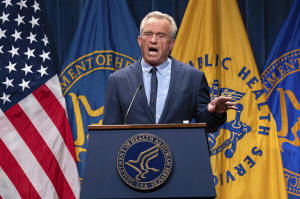RFK Jr. ousts entire CDC vaccine advisory committee
[June 10, 2025]
By LAURA UNGAR and AMANDA SEITZ
Health Secretary Robert F. Kennedy Jr. on Monday removed every member of
a scientific committee that advises the Centers for Disease Control and
Prevention on how to use vaccines and pledged to replace them with his
own picks.
Major physicians and public health groups criticized the move to oust
all 17 members of the Advisory Committee on Immunization Practices.
Kennedy, who was one of the nation’s leading anti-vaccine activists
before becoming the nation’s top health official, has not said who he
would appoint to the panel, but said it would convene in just two weeks
in Atlanta.
Although it’s typically not viewed as a partisan board, the entire
current roster of committee members were Biden appointees.
“Without removing the current members, the current Trump administration
would not have been able to appoint a majority of new members until
2028,” Kennedy wrote in a Wall Street Journal opinion piece. “A clean
sweep is needed to re-establish public confidence in vaccine science."
When reached by phone, the panel's now-former chair — Dr. Helen Keipp
Talbot of Vanderbilt University — declined to comment. But another panel
member, Noel Brewer at the University of North Carolina, said he and
other committee members received an email late Monday afternoon that
said their services on the committee had been terminated but gave no
reason.
“I'd assumed I'd continue serving on the committee for my full term,”
said Brewer, who joined the panel last summer.

Brewer is a behavioral scientist whose research examines why people get
vaccinated and ways to improve vaccination coverage. Whether people get
vaccinated is largely influenced by what their doctors recommend, and
doctors have been following ACIP guidance.
“Up until today, ACIP recommendations were the gold standard for what
insurers should pay for, what providers should recommend, and what the
public should look to," he said.
But Kennedy already took the unusual step of changing COVID-19
recommendations without first consulting the committee — a move
criticized by doctors' groups and public health advocates.
“It's unclear what the future holds," Brewer said. “Certainly provider
organizations have already started to turn away from ACIP.”
Kennedy said the committee members had too many conflicts of interest.
Currently, committee members are required to declare any potential such
conflicts, as well as business interests, that arise during their
tenure. They also must disclose any possible conflicts at the start of
each public meeting.
But Dr. Tom Frieden, president and CEO of Resolve to Save Lives and
former director of the Centers for Disease Control and Prevention, said
Kennedy's actions were based on false conflict-of-interest claims and
set “a dangerous and unprecedented action that makes our families less
safe” by potentially reducing vaccine access for millions of people.
“Make no mistake: Politicizing the ACIP as Secretary Kennedy is doing
will undermine public trust under the guise of improving it,” he said in
a statement. “We’ll look back at this as a grave mistake that sacrificed
decades of scientific rigor, undermined public trust, and opened the
door for fringe theories rather than facts.”
[to top of second column]
|

Health and Human Services Secretary Robert F. Kennedy Jr. speaks
during a news conference on the Autism report by the CDC at the
Hubert Humphrey Building Auditorium in Washington, April 16, 2025.
(AP Photo/Jose Luis Magana, File)

Dr. Georges Benjamin, executive director of the American Public Health
Association, called Kennedy's mass ouster "a coup.”
“It’s not how democracies work. It’s not good for the health of the
nation,” Benjamin told The Associated Press.
Benjamin said the move raises real concerns about whether future
committee members will be viewed as impartial. He added that Kennedy is
going against what he told lawmakers and the public, and the public
health association plans to watch Kennedy “like a hawk."
“He is breaking a promise,” Benjamin said. “He said he wasn’t going to
do this."
Dr. Bruce A. Scott, president of the American Medical Association,
called the committee a trusted source of science- and data-driven advice
and said Kennedy’s move, coupled with declining vaccination rates across
the country, will help drive an increase in vaccine-preventable
diseases.
“Today’s action to remove the 17 sitting members of ACIP undermines that
trust and upends a transparent process that has saved countless lives,”
Scott said in a statement.
Republican Sen. Bill Cassidy of Louisiana, a doctor who had expressed
reservations about Kennedy’s nomination but voted to install him as the
nation’s health secretary nonetheless, said he had spoken with Kennedy
moments after the announcement.
“Of course, now the fear is that the ACIP will be filled up with people
who know nothing about vaccines except suspicion,” Cassidy said in a
social media post. “I’ve just spoken with Secretary Kennedy, and I’ll
continue to talk with him to ensure this is not the case.”
The committee had been in a state of flux since Kennedy took over. Its
first meeting this year had been delayed when the U.S. Department of
Health and Human Services abruptly postponed its February meeting.

During Kennedy’s confirmation, Cassidy had expressed concerns about
preserving the committee, saying he had sought assurances that Kennedy
would keep the panel's current vaccine recommendations.
The webpage that featured the committee’s members was deleted Monday
evening, shortly after Kennedy’s announcement.
___
Associated Press writers Zeke Miller, Devi Shastri and Mike Stobbe
contributed.
All contents © copyright 2025 Associated Press. All rights reserved |